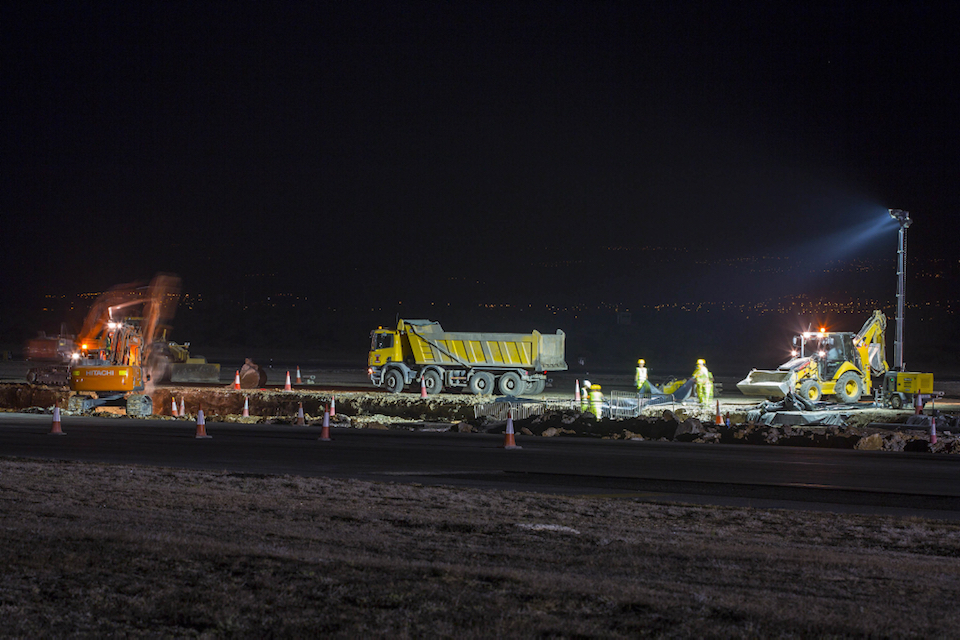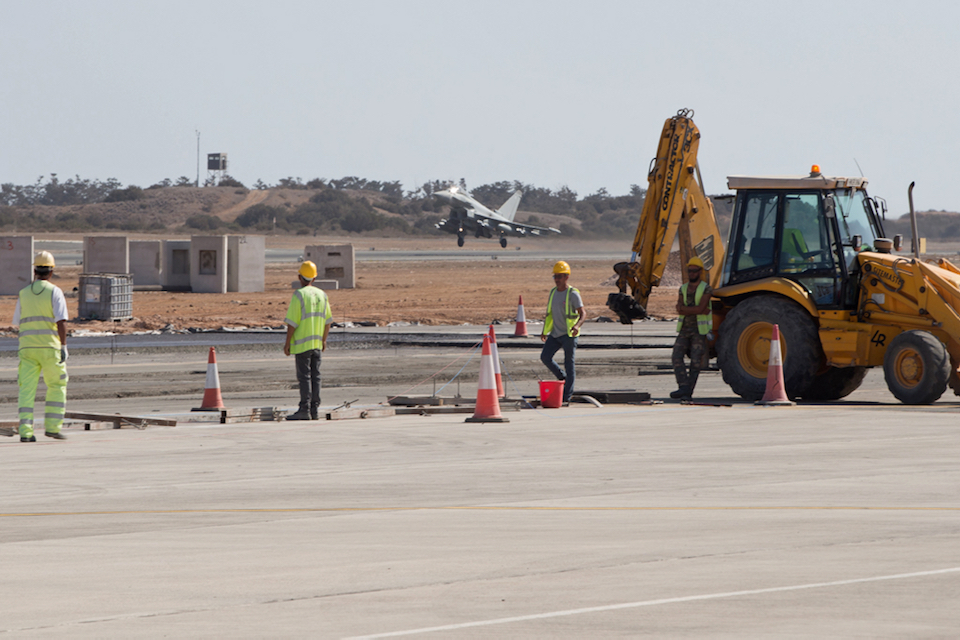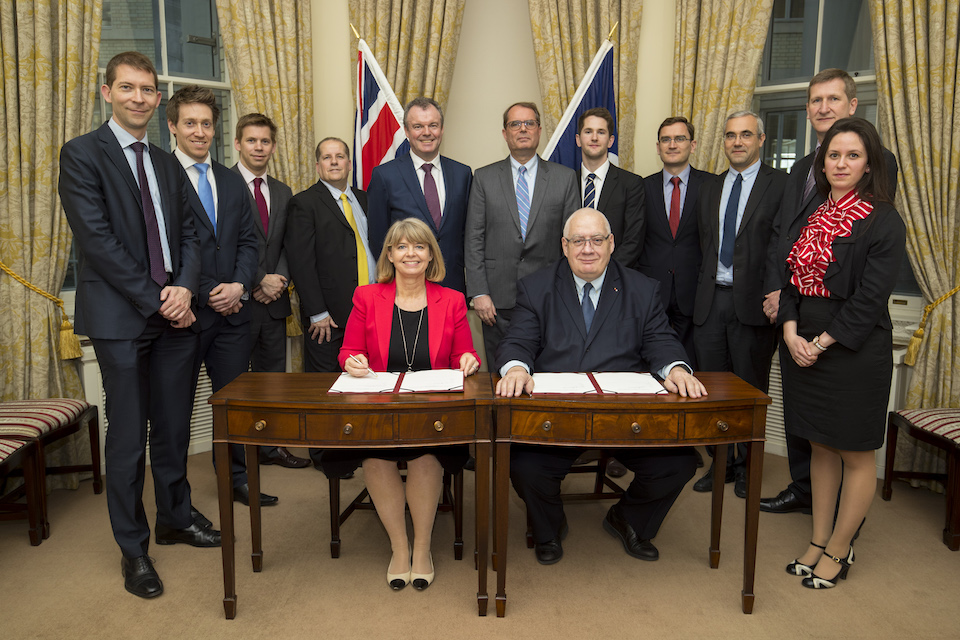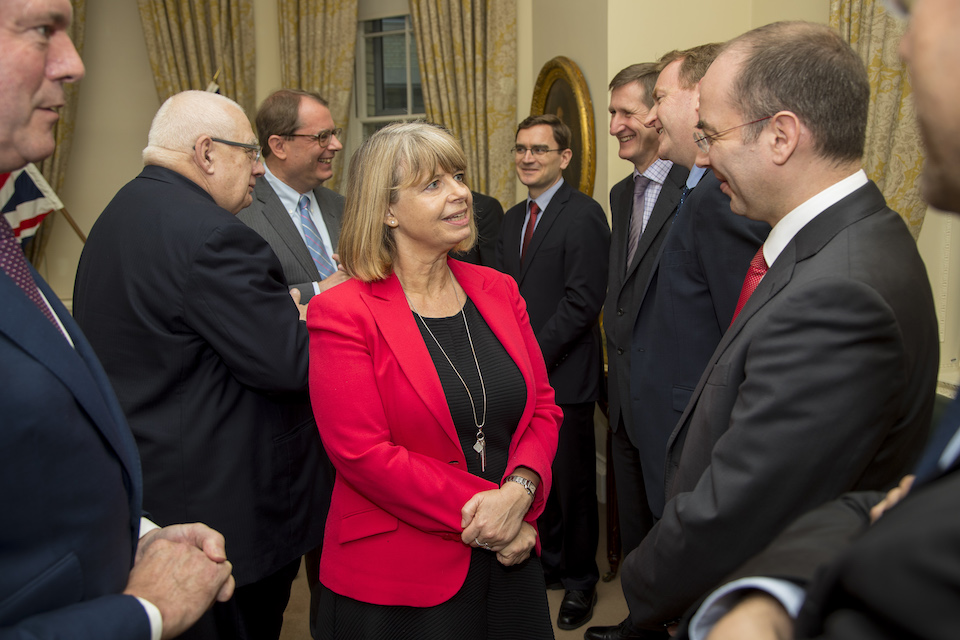It’s a pleasure to open your conference today.
Our theme, international security, is a tragically timely one in light of last Wednesday’s terrorist attack.
Little more than five minutes’ walk from here…innocent people…not just from Britain…but from China, France, Greece, Ireland, Italy, Poland, Romania, South Korea and the United States….were mercilessly mown down.
Four innocent people lost their lives – including a brave police officer, PC Keith Palmer – who was guarding the gates of Parliament.
Dozens more were injured.
This was not just an attack on all of those people – but on the centre of our democracy and our way of life.
In the past few years our security services have thwarted over a dozen plots.
Tragically this one got through.
Yet, as those events unfolded, the British people showed their defiance.
The terrorists sought to divide us, they always seek to divide us.
But we are more united than ever in defending our way of life.
And in a few days’ time…when our Prime Minister triggers Article 50 and we begin the process of leaving the European Union…we won’t simply be strengthening our Parliamentary sovereignty…retaining control of our borders and our laws…we’ll be becoming an even more Global Britain…standing up for British values and the international-rules based system…alongside our friends and allies.
And I’m proud that we can count our Commonwealth colleagues amongst the closest of our friends.
Over the next 12 months an event is taking place that will encapsulate that relationship…as the Queen’s baton wends its way across the Commonwealth…en route to its destination on the Australian Gold Coast…where next year’s Commonwealth Games are to be held.
During that time it will pass from hand to hand over 230,000 kilometres…before reaching its final destination.
I’m told there is a message inside the baton that will eventually be read out to all the competitors.
But the real message is in the medium.
For the baton shows that the diversity among our 52 nations…the differences between our 2 billion people…are transcended by the things we share…not just sport…but our values of freedom, justice and democracy.
One hundred years ago our nations…some of them fought shoulder to shoulder to defend those values…at the battles of Passchendaele and Arras – that we commemorate 100 years later this year.
During the Great War…those troops’ heroism was remarkable. They were often volunteers. Fighting far from home.
And as chair of the Commonwealth War Graves commission…it’s a huge source of pride to me…that we continue tending the final resting places of all the 1.7 million Commonwealth men and women…who died in two World Wars
Each grave identical…no distinction given to colour, or creed, or cap badge…because though their backgrounds differed…their cause was the same.
Yet the values they fought for in those two world wars remain under threat today.
From the home-grown Islamist terror we’ve seen in our capital
and in cities across the world.
From Daesh in the Middle East…and from extremist franchises across Africa. From a nuclear armed North Korea in the Asia Pacific. From Russian aggression in Eastern Europe.
Those dangers, as our 2015 Strategic Defence Review underlined, are growing in diversity, complexity and concurrence
Each of them poses a risk to the stability of the international rules-based order on which our security and prosperity depend. In the face of such dangers we’re sticking to the roadmap set out in the SDSR.
Based around three key principles:
First, we are standing up for our democratic values.
When it comes to Daesh…calling out its extremist narrative…working with Islamic scholars to debunk its claims to legitimacy…and demonstrating to its potential followers…that their way is nothing but a dead end.
And when it comes to Russia…we’re clear-eyed about a pattern of behaviour that is becoming more assertive and persistent.
We want Russia to change tack, abide by the Minsk agreements, to curb the reckless military activity, and to ditch the misinformation.
If it does, then there is the potential for a better relationship…In the meantime, we should ‘engage but beware’ as the PM has said.
But talking and engagement is not enough.
Our second principle is about strengthening our deterrence.
Deterrence is really about ensuring our adversaries know the benefits of any aggressive action are far outweighed by the costs.
So today we’re investing our growing budget…not just in nuclear Dreadnought submarines…and conventional armaments from carriers and frigates to F35s and attack helicopters…but in new disruptive capabilities such as cyber.
Cyber I know is on your conference agenda for Friday. Just as it was on our SDSR agenda…as a Tier One threat…up there with terrorism or a major natural disaster.
Today our adversaries are increasingly turning to cyber.
So we’re investing here £1.9 billion to develop cyber capabilities and skills across all government departments and setting up the new National Cyber Security Centre.
Our military cyber workforce is already among the best in the world – with cyber integrated into all three services.
But, in such a fast moving environment, we must continually enhance our skills.
Which is why, we’re establishing the Defence Cyber School at Shrivenham in the autumn and standing up a Cyber Security Operations Centre at Corsham, in Wiltshire.
Forthcoming cyber exercises will also continue to test and improve their skills.
And this week Information Warrior 17 gets underway…with the Royal Navy launching its first large scale cyber war games…testing out a pioneering Artificial Intelligence…able to speed up complex decision making.
And we’re not just interested in defensive but offensive cyber.
Those who threaten cyber attacks against us need to know the risk they’re running.
So our National Offensive Cyber Planning is integrating cyber into our military offensive.
The third principle is the need to become international-by-design.
NATO remains the bedrock of our defence…and in the wake of multiple threats… has never been more important.
So we’re not just meeting the Alliance target to spend 2 per cent of GDP on defence…but we are reassuring our allies in the face of Russian aggression…by leading the Very High Readiness Joint Taskforce…and continuing to support NATO’s Air Policing mission.
For three years our fighters safeguarded Baltic airspace.
Today I can announce the legendary 3 (Fighter) Squadron…who earned their wings in two world wars…will now be deployed to Romania from May… this time to protect Black Sea skies.
3rd Squadron has a glorious history. 100 years ago it was a fighter scout unit assisting our forces in the trenches.
In World War 2 it was at the forefront of our air defences destroying nearly V1 flying bombs. More recently it took tours of Sierra Leone and Iraq during the second gulf war and it was the first frontline Squadron to be equipped with Typhoons which will now be leading our efforts to confront aggression…with the UK the first nation to provide jets to support this particular mission.
All the while, we’re supporting NATO’s Enhanced Forward Presence and last week dispatched troops to Estonia.
So our new force in Estonia will not just be working closely with Allies to provide reassurance but assisting NATO efforts to counter the misinformation of a “post-truth” age.
Next month, a British Army team, including Royal Navy and Air Force personnel, will participate in Exercise Locked Shield organised by the NATO Cyber Defence Centre in Tallinn…it is designed to see how an international team of experts can defend a simulated network from attack.
Now, all these actions are proportionate and defensive.
As well as assisting the Alliance to up its game we’re also putting our high-tech skills at the disposal of the 68-nation Counter-Daesh coalition…so as well as striking terrorist targets and…cutting their finances…and stemming the flow of foreign fighters to Iraq and Syria…we’re also tackling them in cyber space.
Partnerships are about more than stopping threats.
They are also about preventing them.
Early intervention in a local crisis can stop it turning to regional chaos.
That’s why Britain is the only major country in the world meeting our NATO target and spending 0.7 per cent of GDP development.
And it’s why 71 years ago after the first meeting of the UN Security Council took place in this hall the UK is helping make the UN fit for the 21st century.
Last year I invited 80 nations to London to improve UN peacekeeping.
We agreed to strengthen the organisation’s planning…to improve performance of its peacekeepers…and honour individual pledges to provide more manpower and materiel.
And in the UK, we are practicing what we preach…sending troops to Somalia to support the fight against Al-Shabaab…and to South Sudan to build a hospital and assist ongoing humanitarian work.
All in addition to the work of our short-term training teams…who from Kuwait to Kenya are doing everything…from training local forces to protecting endangered species from poachers.
So we’re strengthening our partnerships with NATO, the counter-Daesh Coalition, and the UN.
What of the Commonwealth?
We’re working with many of you to front up to aggression.
We have numerous bi-lateral relationships…and our partnership with Commonwealth allies…as part of our Five Eyes Intelligence Alliance and our Five Powers Defence Arrangement
But for me the Commonwealth has an even bigger role.
Defence can banish despair in fragile nations. But the Commonwealth can do more than that.
It can bring hope.
I’ve had the great privilege to see some of the Commonwealth’s work up close.
I’ve seen you fighting poverty…to support good governance…to devise innovative solutions to challenge climate change.
I’ve see you fighting for people’s right to make a better life.
Putting into practice the values of the Commonwealth Charter of democracy, human rights and the rule of law.
And delivering on the commitment of all members to the development of free and democratic societies and the promotion of peace and prosperity to improve the lives of all peoples of the Commonwealth.
That ambitious vision depends on delivering the security and safety that our people deserve – and that depends on us all making and winning the argument that defence is vital in safeguarding our way of life.
So let me just say in conclusion, last week’s terrorist attack wasn’t the first time…we’ve seen an attack on what Winston Churchill once called “the citadel of liberty”.
76 years ago Nazi bombs destroyed the Chamber in the House of Commons.
Yet the enemy couldn’t touch the spirit of the British people…and while the great chamber of the Commons was rebuilt…we moved here, to this very hall.
As one of my Parliamentary colleagues said last week…nothing stops democracy.
So let’s keep working together…Let us keep passing our baton of peace across the world…because in the fight against aggression… our greatest weapon remains democracy…and as Karl Popper once said:
“Only freedom can make security secure”.




